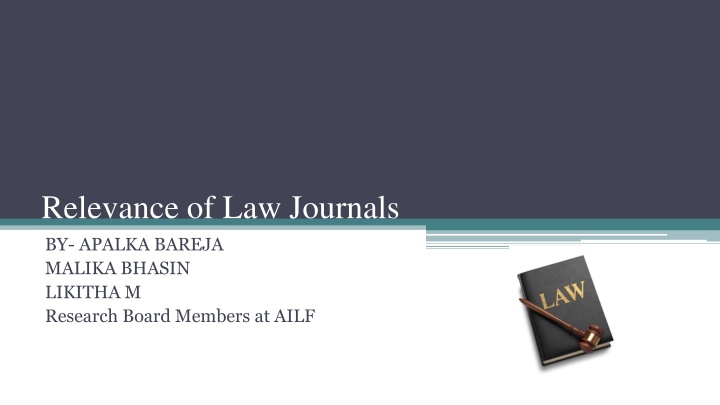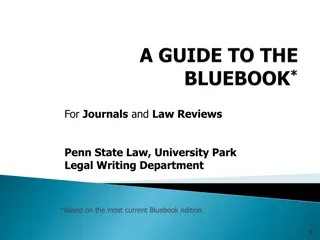Significance of Law Journals for Legal Career Advancement
Law journals play a crucial role in legal education and practice, offering insights into court decisions, legislation, and diverse legal topics. Joining a law journal in law school can enhance one's legal scholarship, improve job prospects, and provide a platform for contributing to legal discourse. By publishing articles written by both professors and students, these journals aid in staying updated with evolving legal landscapes and building a strong resume. Explore the various types of law journals available, including student-edited and professional journals, each offering unique opportunities for growth and learning in the legal field.
Download Presentation

Please find below an Image/Link to download the presentation.
The content on the website is provided AS IS for your information and personal use only. It may not be sold, licensed, or shared on other websites without obtaining consent from the author.If you encounter any issues during the download, it is possible that the publisher has removed the file from their server.
You are allowed to download the files provided on this website for personal or commercial use, subject to the condition that they are used lawfully. All files are the property of their respective owners.
The content on the website is provided AS IS for your information and personal use only. It may not be sold, licensed, or shared on other websites without obtaining consent from the author.
E N D
Presentation Transcript
Relevance of Law Journals BY- APALKA BAREJA MALIKA BHASIN LIKITHA M Research Board Members at AILF
WHAT ARE LAW JOURNALS? The Law Journal is a legal periodical covering notable court decisions, legislation and news concerning the law. Appropriate for attorneys but written to ensure everyone can easily understand the law. Mostly written by advocates & law researchers & students. It not only helps layman to understand the legal provisions but it also keeps them updated as law is always evolving with time and changing.
INTRODCUTION OF LAW JOURNALS IN LAW SCHOOL One of the most common extracurricular activities for law school students is joining a law journal, which is generally a student-run publication that features articles from law professors on a variety of general topics or more specific ones if the journal is specialized. Most law schools have one flagship law journal and a slew of smaller, more specialized journals on specific topics such as environmental law, race and gender, intellectual property, and more. For law students law journal can be a very beneficial activity for one s legal career. It can also be extremely time-consuming, so it s critical for a law student to understand what they re getting into.
In the legal field, law students mostly in their second or third year of studies run the journals and select and edit the articles. Professors submit their work to various journals, and the student editors decide what gets published. There are independent journals as well lead by law firms and advocates for publication in that students or advocates individually apply for publication of their articles and papers.
Being on the board of a law journal publication students could potentially help shape legal scholarship and discourse. Judges love to see legal publication on a resume, especially when a new lawyer is applying for a judicial clerkship and many law firms and other employers are similarly impressed. Law Journal not only helps to build up resume but it also helps for greater understanding about legal subjects and areas which would help when one starts practising in real world.
KINDS OF JOURNALS There are different kinds of journals such as Student edited journal and professional journals : Student Edited Journal: Most law schools have one flagship law journal and a slew of smaller, more specialized journals on specific topics such as environmental law, race and gender, intellectual property, and more. For law students law journal can be a very beneficial activity for one s legal career. The articles published covers a wide range of topics. It can also be extremely time- consuming, so it s critical for a law student to understand what they re getting into. Publishing in a flagship law journal is often seen as more prestigious.
In the legal field, law students mostly in their second or third year of studies run the journals and select and edit the articles. Student editors decide what gets published. The student editors of specialized journals may have more interest and therefore more expertise in their special areas. Some specialized journals are very well respected. Professional Journals: These articles are written by professionals with subject to specific training , they use technical language and assume their readers have prior knowledge of the subject. This journals can be used by the students to know how a professional person understands an issue. This law journals published by professional associations are typically edited by the editorial board. When they review articles for publication , they send them out to experts for a peer review process.
Unpublished journals: In colleges students research on topics and write articles and for some reasons it will not get published , so this articles are kept in the library in the form of journals, so the other students can go through it and make use of it. The students who are making use of the information mentioned in journal as to mention the article heading and the author name in their footnote. There are independent journals as well lead by law firms and advocates for publication in that students or advocates individually apply for publication of their articles and papers. Being on the board of a law journal publication students could potentially help shape legal scholarship and discourse. Judges love to see legal publication on a resume, especially when a new lawyer is applying for a judicial clerkship and many law firms and other employers are similarly impressed. Law Journal not only helps to build up resume but it also helps for greater understanding about legal subjects and areas which would help when one starts practising in real world.
WHY A LAW STUDENT SHOULD USE JOURNALS ? Journals are typically broken down by several subcategories. Diving the subjects into smaller subjects helps student to pinpoint the desired topic. Journals offers insight into its defined subject matter. Journals provide an overview of new developments in law and legal practice. It helps in finding summaries of case laws which can be very useful when trying to understand a complex and long judgment. The students who go through the journals are encouraged to write an article and publish them in those journals . By going through the journals students get a complete picture of the topic which they are looking for..
They can go through the journals get an idea as to how the research can be done and what resources they can utilize to build their article. Journals give you an idea as to how the articles written is edited and what all should be there in an article Engaging in conversation about the issues progresses a law student s use of logic and verbal skills by participating in debate and defense of their position on a subject.
HOW TO GET YOUR PAPERS PUBLISHED? Tailor your paper depending on the journal to which you send your paper: For example, if you have discussed in your paper a socio legal issue, you may have more luck by submitting to a journal which is focused on socio-legal issues rather that a main law journal etc. Audience : Remember that your audience at law journals would consist of a mixed bag of people, mostly who would scrutinize your papers before publishing them in their journals. Put your best foot forward by submitting and engaging and well thought out paper. Concise: The key to a well researched paper is that it is concise, adheres to the word limit and immediately captures the readers attention. This also applies to the cover letter that you send to such law journals for publishing your paper.
Originality: What is expected out of a well researched paper is not always an original idea but an original form of expression of that idea. Putting it simply, a creative yet unique argument or analogy well set your paper apart from the others in a long pile of submission. Citations: It is necessary to support your arguments and analogies with thorough footnotes and citations as it provides substantial proof and proves your dedicated work. However, don't over cite or rely over it completely. Refine: It is important to send a refined and polished paper to the journals in which you want your paper to be published. Ensure that your articulation and citation are to the point.
Flexible: It is quite possible that Law journals might ask you to make certain substantial revisions to your articles/ research paper within a stipulated time. Being flexible with revisions and timings will improve your chance of publication. Be Polite: Always Remember, rejection is an inevitable part of the process and so always accept comments on your paper in a positive manner as constructive criticism helps one grow. Accept the rejection and be cordial .
CITATIONS As mentioned earlier, citations is one of the most crucial and important part of a research paper. One has to ensure that the citations are correct or it might lead to plagiarism. Acitation is a way of giving credit to individuals for their creative and intellectual works that you utilized to support your research. It can also be used to locate particular sources and combat plagiarism. Most used citation is the Blue Book Citation.
TYPES OF CITATIONS: OSCOLA: https://www.law.ox.ac.uk/sites/files/oxlaw/oscola_4th_edn_hart_20 12quickreferenceguide.pdf BLUEBOOK (19THEDN.): https://rgnul.ac.in/PDF/f7ff0636-9075- 47f2-8e17-a5ba7be7a3cf.pdf CHICAGO STYLE: https://www.chicagomanualofstyle.org/tools_citationguide/citation- guide-1.html HARVARD REFRENCING: http://libraryguides.vu.edu.au/harvard/getting-started-with-harvard- referencing























